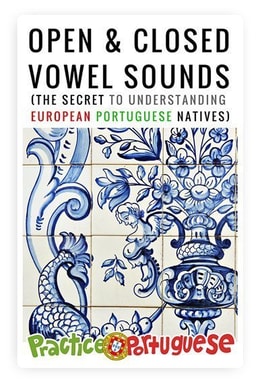Open & Closed Vowels in European Portuguese
Many learners find European Portuguese natives much more difficult to understand than Brazilians – mainly because when spoken, it sounds much more closed.
In some cases, there are even vowel sounds that are barely audible! (Make sure you already saw the Mystery of the Disappearing Sounds as an entertaining 2-minute introduction!)
In this 2nd of our 3 video lessons in this special series, we explore what we consider the most challenging aspect of European Portuguese comprehension: Open, medium and closed vowel sounds.
By mastering this lesson, you’ll not only better understand what European Portuguese natives are saying, but you’ll make your own accent sound a lot more authentic when you’re speaking Portuguese.
Important: We designed this video to be an ultimate resource that you can return to many times, regardless of your current level… so don’t expect to understand and master every single pronunciation rule after just viewing it the first time! Watch it all the way through the first time just to get the general idea, then return to the content in multiple study sessions, pausing and rewinding as necessary.
Download the PDF guide below for more suggestions on how to use this lesson. Use it to follow along with the video and refer back to later.

Download the Featured PDF for free below
 We hate spam and guarantee you 100% privacy. You can unsubscribe at any time.
We hate spam and guarantee you 100% privacy. You can unsubscribe at any time. Download PDF
Download PDF
It’s Your Turn to Practice!
Use the interactive diagram below to listen to and practice all these vowel sounds! (Watch video for demonstration).
Note: Unfortunately, we needed to remove the recording functionality, but you can easily use a voice memo app or other solution to hear your own voice as your practice.
(Make sure to also check out the 1st lesson in this series:
5000 Words You Already Know)
December 19, 2023
November 13, 2023
April 9, 2023
May 12, 2022
May 5, 2022
April 28, 2022
April 21, 2022
April 14, 2022
April 7, 2022
March 31, 2022
 We respect your privacy and have a ZERO TOLERANCE for spam.
We respect your privacy and have a ZERO TOLERANCE for spam.













I´m portuguese and I’m learning polish. After seeing this video I realized how difficult it is to learn my mother tongue and I’ll stop complain about polish language. Adoro os vossos vídeos! Bom trabalho!
I am not sure… I am polish and I try to learn portuguese. But stii I think the vowells in Your language are not easy and it’s difficult for me to remebert and to catch when I should use medium or close vowells. Polish is much easier:)
As a ‘Polonesa’ learning portugues I think our languages have so much common, even in pronunciation. Good luck to everyone who makes an effort to learn either Polish or Portugues – parabéns a todos destemidos! 😉
What can one say except that this is just brilliant! It is the best explanation and tool there is for the language. Muito obrigado!
I want save the video it so helpful. Can you tell me how to download this video
You guys are the best! Obrigada!
Genius!!! This is exactly what everyone who studies European Portuguese should know about its phonetics! The explanation is perfect! Thank you guys! You are an doing an excellent job!
I loved this lesson. I’m glad Joel brought up the ‘Obrigado’ example. If often sounds to my ear that when people in Lisbon say ‘Sim senhor’, it sounds like ‘Sim senhore’ (or sometimes like ‘Sim senhora’).
Very, very useful. Going to have to listen to it several times as there is so much in there. So glad I discovered you. Thanks.
Fabuloso! Os meus parabéns por um trabalho extraordinário!
This is absolutely great….but it’s so SCARY….. PLEASE DO NOT SHOW THIS TO BEGINNERS. You may scare off lots of people who start learning Portuguese. It’s absolute must for mid-beginners, intermediates, advanced folks. NOT FOR EARLY BEGINNERS
Andrew, thanks for the comment and you’re absolutely right about this being challenging for complete beginners. We worked hard to make it as complete of a resource as possible to be an invaluable tool for the community in the long term for as many learners as possible. Our hope is that if beginners watch it, it would serve as an overview so they can have a head start and look out for these things as they progress, then return to the concepts later over time when they’re ready. It will depend on their attitude going into it – if a beginner goes in with a curious approach, accepting that they won’t understand everything at this stage, then we hope they will still get a lot out of this. I would have loved to have had this information earlier on in my studies just so I could have been aware that these different sounds exist. So fingers crossed we will empower more beginners than we will scare away… time will tell. Thanks again 🙂
Joel. Agree 100% 🙂 Your podcast and website are the best teaching tools on the web for European Portuguese. Thanks again!
I’m a beginning, and while this is terrifying, it’s also incredibly useful. Because it demystifies something: All those sounds I’m hearing aren’t arbritary. Because my ear isn’t trained yet, I really can’t tell the difference between most of these sounds, and it seems like Rui is arbitrarily pronouncing things differently all the time. But this video shows that he is actually making a lot of different sounds that my ear just can’t hear yet. So once my ear is trained, I’ll be able to distinguish it. So rather than scaring me away, it’s making realize that I just need to have patience. It’s not like Japanese, for example (which I’ve studied for many many years), which has very simple and unchanging sounds. Yet the Japanese grammar is incredibly complex. Portuguese sounds are incredibly complex, but the grammar is very simple. But thankfully we also have Joel, and because Joel still speaks with something of a Canadian accent, he is easier to understand. So when I listen to Joel, I gain more confidence. When I listen to Rui, I gain more sophistication. So it’s a fantastic tag-team that most language studios don’t have!
This material may be challenging, but it is ABSOLUTELY essential for beginners… I haven’t started any study yet of the meaning of Portuguese words; I have only been focusing on hearing/distinguishing the sounds, and I feel confident that practicing this will make it much, much easier to hear – and THEN understand – native speech. I’ve been using The Mimic Method to study Spanish and now EU Portuguese, and the focus is fundamentally about training your ear and mouth to make sounds accurately, just the way babies do when they’re figuring out how to mimic the language spoken to them. The sense of sounds (word meaning) comes later, from context, and this kind of solid foundation in the reality of speech makes it much easier to learn words — rather than “deciding” inside your head how something “should” sound, then later learning that native speakers don’t pronounce it that way at all! It’s much harder to go back and unlearn bad habits. Better to start off right! Thank you Joel and Rui for an excellent video!
Wow!!! I just finished watching this video and I am so impressed with the amount of work I know you guys put into this, and at the amount of information that you gave us! I am very excited to watch this over and over in an attempt to begin digesting everything. Thank you guys so much!!! This is invaluable information!
You have clarified so many things I’ve struggled with in the past several years of learning European Portuguese! You are able to organize and explain things in ways I have not encountered before. Amazing!
FYI: The file associated with this lesson downloads with the same title as for the first lesson rather than its correct title.
Thanks Tomás, just fixed it 🙂
I wish I had these tools before visiting Madeira and Lisboa in September. Now I know why so many people looked at me funny when I spoke. You guys are the best. Keep the lessons coming and eventually I’ll make my Portuguese grandparents proud.
You guys are so generous, funny and sweet, thank you so much for these incredible videos and all the hours of work and the podcasts and everything. You are doing a great and important thing here! Xx
é fantástico! muito obrigada!
Thank you so much for bringing together so much information that has been scattered throughout my Português learning history and bringing it together in this fantastic resource. I cannot image how much work this must have been. The vowels have been such a source of confusion to me and this resource will help so much. You guys are awesome.
É fantástico para mim. Em 7 semanas, vou fazer o exame CIPLE A2 e isto vai ajudar muito. Obrigada para os vossos trabalho. Beijinhos.
Hi Rui & Joel, I am thoroughly enjoying this metod of learning Portuguese. Muito obrigada !
Oh, you’re doing my head in (in a good way) with all this new stuff that I wish I’d seen years ago. Another totally awesome video.
This is SUCH a useful lesson and the tool is fantastic. I remember one of my first Portuguese teachers trying to teach me the difference between medium and closed e sounds and I just couldn’t hear it, let alone say it. I will be using your practice tool, Joel, so thank you!
WOW, I love it. Its about a week of work for me.
Thank you very much for this fantastic video! It’s extremely helpful. Muito obrigada!
Really superb! Explains things that have been puzzling me for years!
Adorável !!!!!!!
Ótimo! Foi maravilhoso! Explicou coisas eu nunca ouvi. Obrigado.
Já agora, visitei recentemente Lisboa durante um longa pausa do meu voo de Luanda para Londres. Gostei Lisboa muito e espero voltar em breve com mais tempo provar-o.
This was fantastic – thank you so much!
Could I make one suggestion and ask a couple of questions about diphthongs?
This was perfect for someone like me who has been learning Portuguese for three months, but it would be good for total beginners to have a more basic pronunciation guide with all the classic stuff you need to know at the very beginning (hard and soft C and G,various possibilities of S/SS and X, how the M or N is often a sign of a nasal vowel and we often don’t say the M in AM, EM etc.)
My question is about the diphthong ‘ei’. Are there really two sounds here? When I hear it in ‘falei’, the last syllable sounds like ‘lay’ in English, but when I hear it in ‘segunda-feira’, the sound is like ‘fire’ in English. Is this right? Am I hearing correctly? Likewise ‘eu’. Sometimes, in words like ‘eu’, I hear ee-oo. But then in words like ‘comeu’, I am hearing ‘may-oo’. I’m old (63) and the ears become much worse at distinguishing between sounds as we get older, so can I check that mine are working OK?
Thanks again. I’ve just discovered your stuff and I think it’s great, especially for people like me in another country who don’t have the chance to practise yet.
This is innovative, in-depth, and just so helpful. Thank you!!
Congratulations, Rui and Joel! You did so well! Thank you very much for this video lesson.
I have been searching for lessons online that would fit my need and personal preference and style. I found your website and tried to listen to some of your podcasts. I found your lessons interesting and tried to imitate your pronunciations. I found it difficult at first, until you launched this video. Kudos! This particular lesson really inspired and challenged me to continue learning European Português language.
Your efforts in coming out with the graphic tools and pronunciation demonstrations made me decide to become a premium subscriber. It is such a pleasure to support your project.
God bless you!
Great stuff! It’s interesting you used the word ‘fall’ for the English example of the open vowel sound for ‘bola’. In fact it’s different in British English. We say ‘fall’ like ‘crawl’ or ‘short’ which is a little longer and is not with the jaw open. Whereas the North Americans say it with the jaw open and to us it sounds like’foll’… 😉
Wonderful and generous work. Thank you 🙂
Just one word .
Brilliant!!!!
Thank you
I’ve now moved to Lisboa and I’ve gone back to this video and realised just how good it is. A really clear explanation. I’m still really struggling both with pronunciation and listening, but this is a big help. Many, many thanks.
Boys you are the best!!!! this video is amazing, it response all my doubts!! I´m learning portuguese and practising english as well!!! I am from southamerica but now Im living in Lx, so 1000 of thank you!!!
See you!
You’re very welcome, Andrea, thanks for taking the time to comment 🙂
Very usesful …. and a pleasure to see you!,
Guys, you are awesome!!! This is the best tool for understanding the sound of this beautiful but very difficult language. I am just a beginner so my struggle is huge for now but I believe that thanks to your help it´ s not gonna for a long time 🙂
Obrigada !!!
Ola Rui
For several weeks I have struggled with the pronunciation of your name
Please explain how that when pronounced it sounds to me like a guttural “Whooeee”
Portuguese can sometimes sound like a Scotsman (like me) rolling his rrrs.
For instance in arroz
But not so in Rui it is much more guttural and no way can I comprehend that the letter r is involved.
Perhaps there are other names/words that start with that, strange to me r sound?
Olá Stan, realmente é um som difícil para quem fala Inglês. É verdade que existem portugueses que enrolam o “r” em arroz, como vocês na Escócia, mas essas pessoas também enrolam em “Rui”, porque um “rr” é igual a um “r” no início de palavra. Eu, e a maioria dos portugueses, no entanto, fazemos um som mais gutural, tal como disseste. E é esse som que é estranho para ti. Pensa que tens qualquer coisa na garganta, comichão por exemplo, e queres coçar a garganta com a vibração das cordas vogais, é mais ou menos assim que produzimos esse “r”. Mas atenção, treina em casa, para não pensarem que és maluco eheheheh. Abraço!
The video is great but i cant get the interactive table to work below the video here. Its done so well but it doesnt play any sound or let me record
Thanks for your comment and kind words! Give it a try in the Chrome browser if possible, as it’s less prone to bugs with this kind of functionality. Cheers
Gracias chicos!!!! Ahora lo tengo mucho mas claro. Thank you, obrigada.
Super useful video and examples.
When I put the “mystery of the disappearing sounds” together with the unstressed to closing motif, I’m still left pondering the mother of all mysteries: para — and no, don’t stop — I mean the preposition para that sometimes, but only sometimes, becomes p[ɨ]ra or p’ra.
What’s the scoop?
Após 3 meses em Portugal, esta é a única ajuda que é realmente eficaz. Eu leio muito bem mas eu não entendo nadado discurso diário. As if listening to extraterrestrials. 😀 E quando eu comecei a falar, essa pronúncia sempre em inglês, acredite ou não, eles não me entendem.:p
Unfortunately, the interactive portion of the site is broken (tested on up to date versions of Chrome, Firefox, and Safari). I wish it wasn’t! It looks very useful (especially hearing them all side by side!)
Please fix 🙂
Thanks for letting us know it’s not working for you! Strange, seems to be working in my Chrome and Safari. Any chance you have an adblocker or similar running? Perhaps wiping cache will do the trick, and making sure browsers are up to date. (Sorry I can’t be of more help, get in touch with us if you’re still having trouble and hopefully we can get to the bottom of this: http://www.practiceportuguese.com/contact/ 🙂 Obrigado!
Ralph and I just bought a home in Sintra and moving there as soon as our home sells in Palm Springs. I’ve just watched your 3 video’s which was inspirational and look forward to more of your teachings. We’re very motivated to learn the language. Obrigado!!! Steve
Congrats to you and Ralph on moving to Sintra, great decision 🙂 Glad you like the videos, and we’re looking forward to making more soon as well! Abraço aos dois
Muito interessante e explica muito. Eu aprendei Portugues quando morei e trarbalhei em São Paulo há muitos anos atrás (1974). Tenho esqucido muito, mas agora quero viajar para Portugal e Galicia. No último mes ouvi algumas artigos no seu website. Por mim portugues de europa é muito dificil entender, mas seu website é exatamente o que preciso. Ontem, inscrivi-me seu Premium. (Desculpe meu portuguese pobre.)
Your lessons knock all video attempts into a cocked hat
This is the way to start out along with listening to the Portuguese
excellent
I just love you guys, you make something I at least find difficult into something I can understand ( remembering and recalling it in conversation is another matter).I love your presentations, just brilliant. Thank you, Rosie xx
Amazing! I still struggle to pronounce the different sounds in “conheço” and “amigo”, but I can now distinguish them when I listen to spoken Portuguese! Thank you for all that you do, I love the videos and I can’t wait to see more from you two. Obrigado pelo tudo e beijinhos
Óla!
I think that this topic is the most valuable one on your website. I’m wondering if you can break this “vowel” video down into 9 different lessons, one on each sound, then possibly create a video on all of the “o” sounds, then on all of the “e” sounds, then all of the “a” sounds and “i” sounds.
As a beginner, I feel that it is just too much material all at one time and not enough time to digest one sound when bouncing back and forth from one to another so quickly.
I can say that pronunciation thus far has been my biggest frustration and confusion, and I feel that I would be able to read/speak/comprehend so much better if I could just have a grasp on all of the vowel sounds and rules.
Is this something that you might consider doing?
I hope so!
Obrigada!
Christine
What did I think? uUauuu !
You so naturally blend in with my exact learner’s needs.. No, you do more than that. You take me by the hand exactly from where I needed it and you do it so charming and clever that I’m being your captive audience in any free moment. And I find myself so lucky to have understood you’re going to continue with more videos??! iiiiiijuppiii
While your lessons and dialogues are so addictive, setting the brain sharp and absorbing, only then any detail that disturbed the attention flow can become apparent; a little flaw in the flow.
In your matchless video lessons a little confusion occurs when the timing of the visual indications on the screen isn’t corresponding with that of your oral explanation. Instead of enforcing the learning, the two different stimuli now give some distortion 🙂
This really is the only suggestion I can think of to perfectionalize your video lessons, to further perfect as they are. And since we’re on it: if editing that timing to perfection isn’t possible, I think not having the signalling might in some cases work better then?
Oh! And suddenly occurs to me a very personal request 😉 With phonetics, as a learner I love to have the correct pronunciation remain echoing in my mind, for me to copy and repeat it. It certainly is often nicely helpful to know how something shouldn’t be said, but hearing Riu’s perfect Portuguese pronúncia as a last and the right example always, would be a bless.
Thank you so! I’m hooked
Amei esta tabela, parabéns!
Wonderful video!! Thank you very much. Now I feel more confident in learning Portuguese.
I really think that beginners like me (0 level) should watch this video FIRST before checking any units, because when I watched my first lesson, I was so confused about pronounciation: just four basic words, and I could not even catch how they are pronounced and why. I’d like to recommend a link to this video on Learn page before OS FUNDAMENTOS 1.
Hi… fantastic video, thank you guy!
I’m new here and still finding my way around. What are the 1st and 3rd videos in the series, and where can I find them, please?
Muito obrigado!
Thank you for your comment, Jeremy!
Here are the other two instructional videos in this series:
– “5000 Portuguese Words You Already Know”: http://www.practiceportuguese.com/videos/words/
– “Tips & Tools For Learning European Portuguese”: http://www.practiceportuguese.com/videos/tools/
These and other videos can be found in the Videos section, which you can find by clicking on “Practice” in the menu at the top 🙂
Thank you, Joseph, I’ll go and have a look!
Love this video. It’s my third time watching it, and I always take away something new.
One thought… The comments about swallowing the terminal e’s is a bit Lisbon-centric. In the north of the country, I’ve noticed that people pronounce those e’s, and even add them when they don’t exist.
That is a good point, we always have to keep regional variations in mind!
This is the best reference for explaining pronunciation of vowels in European Portuguese that I’ve found. Thanks so much!
In Brazil we Just don’t have thebI closes and the u closes…. We Just don’t in grammar or spoken they simply don’t exist.
I know this video has been out for a while and there are a lot of comments. Someone may have already mentioned this, but I noticed that Joel said English didn’t have any nasal vowel sounds, or at least he didn’t think so. I believe we do, although certainly not as many as Portuguese. A simple example is can’t. I was told that an easy way to tell if a sound has a nasal component is to say the word normally and then say it again with your nose pinched closed. You can clearly “hear” the effect this has while saying the word. This trick works for Português as well of course. Try it with naçao and be amazed!
Great point – yes you’re right that there is nasalization of vowels that come before [n], [ŋ], and [m] in English (and in some dialects that final consonant would even be dropped). The difference is that Portuguese has nasal vowels which are “phonemic”, which basically means that it functions as a separate vowel sound, in a sense, that can actually serve to make a distinction.
In other words, if you produce a sound as a nasal vowel vs a non-nasal vowel in Portuguese, the meaning can change. For example:
So we have some nasalization in English, but we don’t have “nasal vowels” (“nasal phonemes”), so to speak. We have “nasal allophones”, which basically means non-contrastive variations in a vowel sound. This is probably getting way too far into the linguistics, but I think it’s interesting. Either way, it’s a good point to mention “can’t” and others, because that gives learners a good comparison for what this nasal quality sounds like. Thanks!
Very interesting. I hadn’t thought about it in this fashion but I see what you mean. French has lots of nasal is the language as well, like non and maison, but I don’t believe it has the concept of “nasal vowels” either.
Portuguese is definitely the most complex language I’ve ever studied, particularly from the perspective of how it’s pronounced. I do wonder at times though what those early Portuguese Kings were smoking! 🙂
Encountering this in late 2021. Thanks for this timeless and effective piece of learning. And completely free! In the name of the hundreds who have benefitted from your tutorials, obrigada!
The pdf that goes along with this is very good but it needs the vocal button to hear the sounds as you read the pdf file. It does not work well trying to go back to the video. Like you do in your lessons and words have a pronunciation button to hear the sounds. It is a lot of useful info and would love to haven the pdf like you do with your lessons. Thanks and it is all great.
This was incredibly helpful! You guys are great. I have to laugh though, as you BOTH mispronounced “pronunciation.” It is proNUNCEiation not proNOUNCEiation.
Excelente!
This is extremely useful. Am loving it! Eu aprendi Portugues ha trinta e cinco anos mas eu esqueci quase tudo! Now my daughter is seeing a guy from Lisbon and my wife and I want to do refresh / learn. One thing. I would humbly request forgiveness but I must correct both Joel and Rui’s English. Like many people they say “pronounciation” when they mean pronunciation. Sorry guys! Anyway, keep up the amazing work. Muito obrigado!
Haha don’t worry, they are aware of their “pronounciation” error and have been living in shame ever since this episode was posted. 😁
As an absolute beginner, my head hurts after watching this. I was confused before watching it, but after watching it, I have become confused at a higher level. When we got to the exceptions to the exceptions for a single letter in an unstressed syllable but not at the end of a word but before the letter L, my notes turned drawings of stick-men stabbing each other and I lost the will to live.
With all that said, I couldn’t hear the difference between many of the wovel sounds before watching it. Around the 20 minute mark, something “clicked”, and suddenly I could hear the difference between an open ‘a’ and a medium ‘a’. An invisibly small step for mankind, but a giant leap for one man!
So thank you very much for pouring so much effort into this video. It will become immensely useful when revisited many times during my study of this fascinating language.
This is been a super useful resource. Most other resources on Portuguese vowels talk about the differences but not how and why they are used. It also brings out one point of confusion that I think some English speakers find… or at least this English speaker does: In school, English speakers are taught that vowels have long and short forms in which the long forms tend to be fuller and more rounded while the short forms tend to be flatter and even a little muddier. Think of the O in coat vs cot. That distinction doesn’t translate perfectly to Portuguese, I’m seeing. The middle vowels sound round and full, sort of like English long forms eg ê and ô vs é and ó. Then, the A has to go out and do the exact opposite. Á sounds like it should be the median vowel and â feels like it should be classed like the é and ó. Do Portuguese children learn their vowels as open and closed the way English speaking children learn long and short vowels?